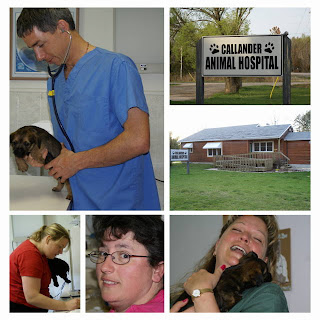BUILDING A POSITIVE RELATIONSHIP WITH YOUR VETERINARY TEAM
Animal ownership is a big responsibility, which fortunately can be made easier with a few very important people in your life. Besides your Breeder and Obedience Trainer your Veterinarian will play a huge role in the health and well being of your new companion. Finding a skilled Veterinarian that you can communicate with and establishing a good working relationship is essential for maintaining your special friend in optimal health.
Once you have found such a veterinarian treasure and respect them. Do not price shop or complain about the cost of caring for your pet. Your vet has gone to great length to develop his knowledge and to provide an establishment filled with skilled and caring people. Medical care is not the place to save a buck or two or heaven forbid delay payment, your pet may be the one to pay the ultimate price in the end.
Maintain regular visits and keep your pet up-to-date on his vaccinations and medications. Don’t just use them for emergency care. Having the vet know your pet when in good health can help speed the diagnoses and ease treatment when in poor health. Regular check ups also helps establish a good working relationship between all involved. Many Vet clinics will allow you to come in and weigh your pet, this is a perfect oppertunity to make visiting the vet a positive experience.
Be on time for your appointment and make sure your pet is clean and well groomed. Let them know if he has any issues that might place the vet and staff at risk.
Since the dog cannot tell us what is wrong veterinary medicine relies on us, the owners to be able to verbalize the signs and symptoms we have observed in order to pin down diagnostic possibilities.
Be knowledgeable about your pet! Regular grooming allows you to check for lumps and bumps that might be hidden under his coat. Make sure to keep track of your dog’s regular routine so that you recognize anything out of the ordinary. Know when and how much he eats. Know what his regular bowel movement is like and how frequently he has one. Know the colour of his urine. Monitor his behavior and know what is usual and unusual. Be aware of things that might cause future problems both in his actions and in his enviroment.
Be clear and concise in your descriptions. Try to keep emotions at bay and do not rely on memory. State all your concerns and be prepared to answer any questions in detail. If you don't understand something or disagree with treatment discuss it openly, fairly and honestly.
If you know your pet and your vet knows his business, together you'll work as an awesome team!
 Last be sure to go that extra mile for your vet clinic! Donate those extra towels, leashes, dog crates etc that you no longer use. Don’t forget the staff! Bringing them in Timmies coffee & timbits. This can go a long way to building good relationships and having them go that extra mile for you on that VERY RARE occasion when you really need them to.
Last be sure to go that extra mile for your vet clinic! Donate those extra towels, leashes, dog crates etc that you no longer use. Don’t forget the staff! Bringing them in Timmies coffee & timbits. This can go a long way to building good relationships and having them go that extra mile for you on that VERY RARE occasion when you really need them to.
No comments:
Post a Comment